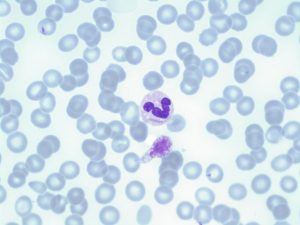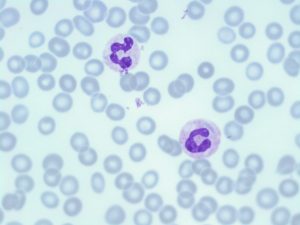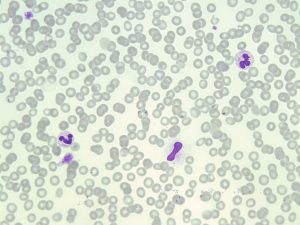68 May-Hegglin Anomaly
Michelle To and Valentin Villatoro
- An image from a peripheral blood smear demonstrating a blue dohle body-like inclusion in a neutrophil and a giant platelet seen in May-Hegglin anomaly. 100x oil immersion. From MLS Collection, University of Alberta, https://doi.org/10.7939/R3W669Q4B
- An image from a peripheral blood smear demonstrating blue dohle body-like inclusions in two neutrophils seen in May-Hegglin anomaly. 100x oil immersion. From MLS Collection, University of Alberta, https://doi.org/10.7939/R34Q7R53S
- An image from a peripheral blood smear demonstrating blue dohle body-like inclusions in two neutrophils along with enlarged platelets seen in May-Hegglin anomaly. 50x oil immersion. From MLS Collection, University of Alberta, https://doi.org/10.7939/R30Z71B9D
PBS Key Features:1-4
Graunulocyte and Monoyte cytoplasms contain large basophilic inclusions that resemble Dohle bodies but are much larger and elongated. Inclusions are composed of precipitated myosin heavy chains.
Giant platelets and thrombocytopenia are also associated with this anomaly.
Cause:1
MYH9 gene mutation
Inheritance Pattern:1,5
Autosomal dominant
Clinical Significance:1-3,5
May-Hegglin anomaly is a platelet disorder that can cause mild bleeding tendencies but majority of patients are asymptomatic. Degree of bleeding is correlated to the degree of thrombocytopenia. Leukocyte function is unaffected.
CBC:1,5
Variable thrombocytopenia
References:
1. Marionneaux S. Nonmalignant leukocyte disorders. In: Rodak’s hematology clinical applications and principles. 5th ed. St. Louis, Missouri: Saunders; 2015. p. 475-97.
2. Harmening DM, Marty J, Strauss RG. Cell biology, disorders of neutrophils, infectious mononucleosis, and reactive lymphocytosis. In: Clinical hematology and fundamentals of hemostasis. 5th ed. Philadelphia: F.A. Davis Company; 2009. p. 305-30.
3. Turgeon ML. Nonmalignant Disorders of Granulocytes and monocytes. In: Clinical hematology: theory and procedures. 4th ed. Philadelphia, PA: Lippincott Williams & Wilkins; 1999. p. 206-16.
4. Bain BJ. Morphology of blood cells. In: Blood cells: a practical guide [Internet]. 5th ed. Chichester, UK: John Wiley & Sons, Ltd; 2015 [cited 2018 Jul 10]: 67-185. Available from: http://doi.wiley.com/10.1002/9781118817322
5. Landis-Piwowar K. Nonmalignant disorders of leukocytes: granulocytes and monocytes. In: Clinical laboratory hematology. 3rd ed. New Jersey: Pearson; 2015. p. 388-407.




